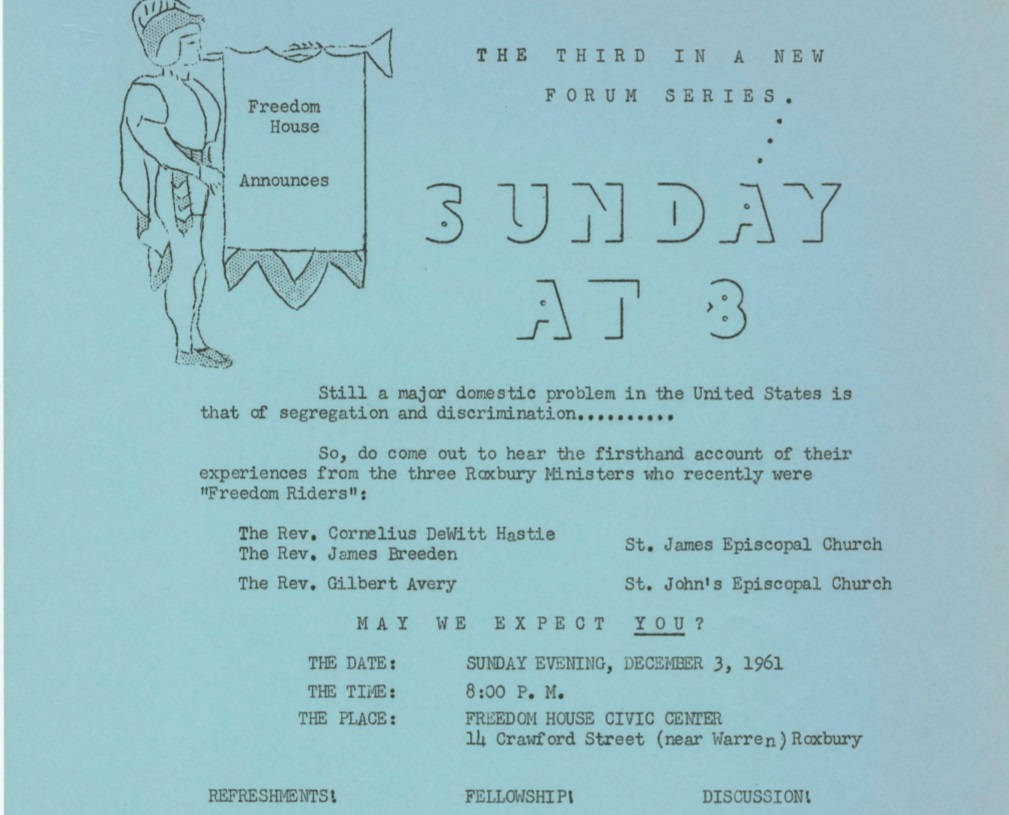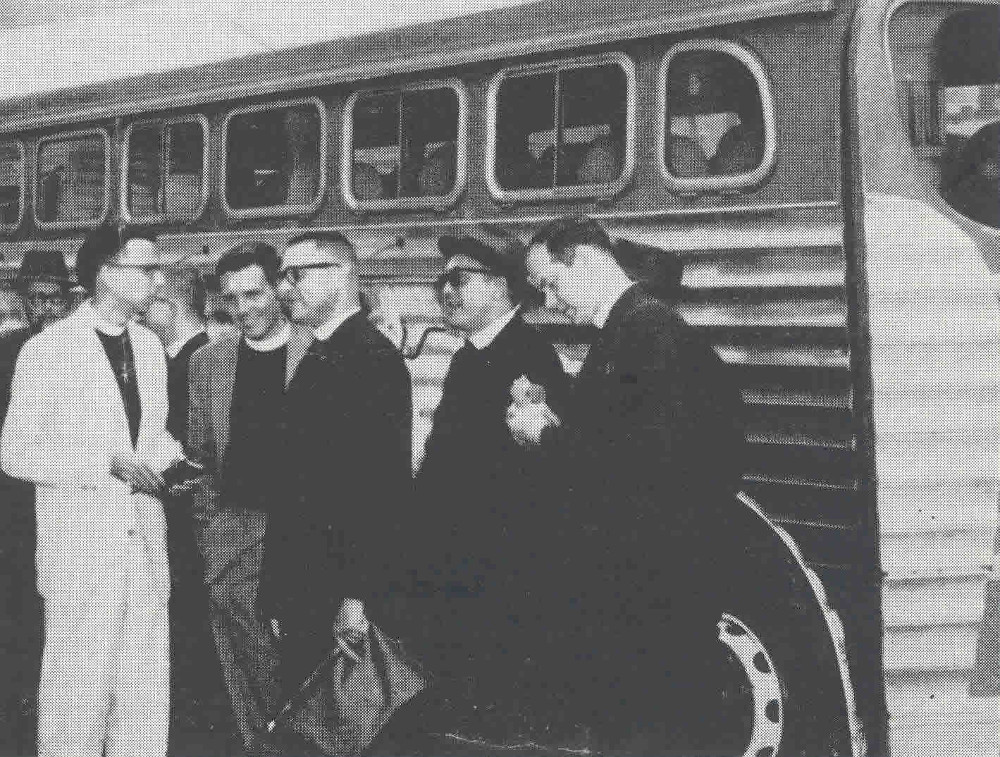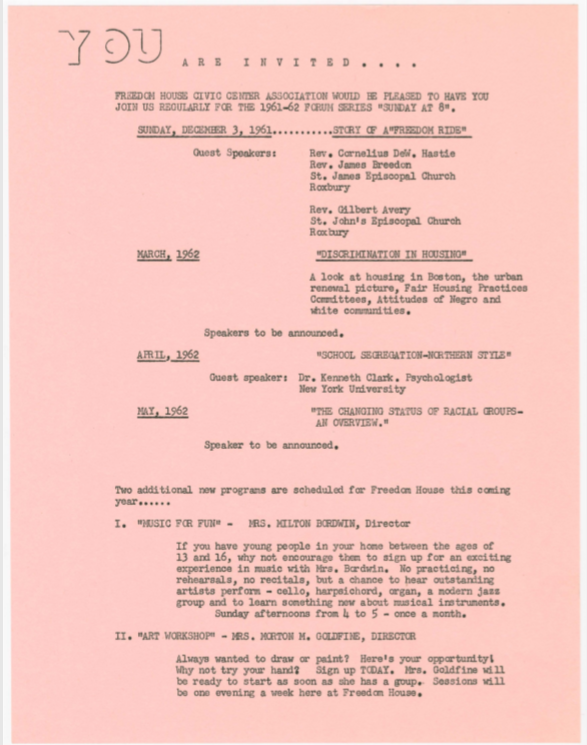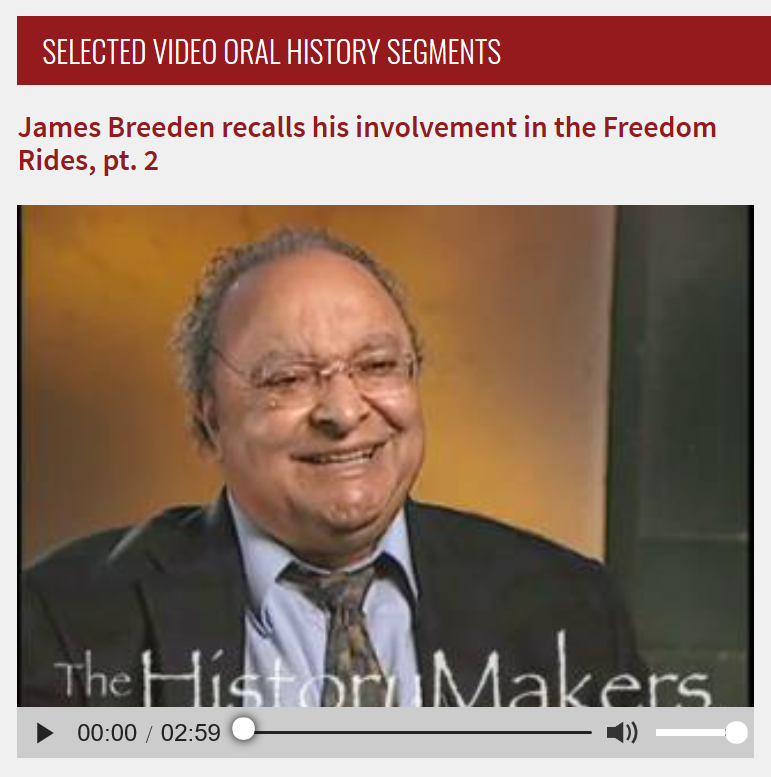History: Civil Rights Activism at St. John's and St. James Episcopal Churches - Early 1960s
During the 1960s, both churches, St. John's and St. James, provided leadership and actively supported and raised money for the civil rights movement, supporting the Freedom Rides and Freedom Schools in the south and supporting the cause of school desegregation in Boston through the establishment of Freedom Schools in Boston and through working with the NAACP and others on the campaign for school integration and educational equity.
The clergy at both churches were actively engaged in civil rights work in Boston and traveling South. The brief bios, below, excerpted from online biographies and archives, shows how this civil rights work infused the life of both churches and the wider community and was part of a life-long commitment to social justice for each of these pastors.


In the spirit of the "Freedom Rides" that were begun in May 1961, the Episcopal Society for Cultural and Racial Unity(ESCRU) announced a direct plan of action to combat racism and promote interracial harmony in the South. A Prayer Pilgrimage" was to be undertaken by a multiracial group of clergy traveling by bus.
Source: Episcopal Society for Cultural and Racial Unity. Website: https://episcopalarchives.org/church-awakens/items/show/113

These flyers, from the Northeastern University archives, announce the speakers for a forum on important social topics. In December 1961, the clergy of St. John's, Rev. Gilbert S. Avery, and the clergy of St. James, Rev. Cornelius Hastie and Rev. James Breeden, spoke about their experiences earlier that year in Mississippi.
Canon James Breeden at St. James

James Breeden's civil rights work is profiled on The History Makers oral history website.
From 1960 until 1965, Canon James Breeden was a member of the Episcopal Diocese as a deacon, priest and canon at St. James Church and St. Paul's Cathedral. He became an advisor to Bishop Anson Phelps Stokes in the area of civil rights.
In 1961, he participated in the Freedom Rides through the "Prayer Pilgrimage" and was arrested in Jackson, Mississippi (along with Rev. Avery and Rev. Hastie and others) for "action likely to cause a riot." (See photo on this page).
In 1963, Rev. Breeden, with Noel Day, a social worker at St. Mark's Social Center in Roxbury, founded a civil rights organization, Citizens for Human Rights (CFHR) and began by raising funds for the voter registration drives and Freedom Rides in the South, gathering over 10,000 for a demonstration on Boston Common and raising enough money to buy a voter registration bus for SCLC. From that start, CFHR became involved in Boston's school desegregation issues and initiated the "Stay out for Freedom" days in Boston protesting segregation and inequality in Boston Public Schools. Students were encouraged to stay out of school on a designated day, and, instead, to attend Freedom Schools that had been set up through churches and community organizations throughout the city. This work is profiled in several histories of the civil rights movement in Boston.

Flier describing the first Stay Out for Freedom Day. The Boston "Stay Out" movement pioneered Freedom Schools, a year before the 1964 Mississippi Freedom Summer. Based on experiences in New York and Boston, Noel Day went on to develop curriculum for the SNCC Mississippi Freedom Summer.
The WGBH Scholar Exhibit "Boston's 1960s Civil Rights Movement: A Look Back" (Audrea Jones Dunham) describes the work of the Citizens for Human Rights, and describes the Stay Out for Freedom days and the establishment of Freedom Schools in Boston.
The WGBH article also describes Breeden's parish work with youth:
As a priest and Canon at St. James Church, Reverend Breeden assisted in the tutorial and after school program and often went to various city schools to meet with teachers on behalf of the children who attended the church's tutorial and after school programs. He also chaperoned the church-sponsored dances for high school students and led discussion groups with the youth, regularly involving 200-400 youth. Moreover, Reverend Breeden provided chaplain services through the Juvenile Court.
Rev. Cornelius Hastie at St. James (later at St. John St. James)
African American children who overflowed a special one-day "Freedom School" in Boston walk to another meeting place accompanied by Rev. Cornelius Hastie on June 18, 1963. Special meetings were held after parents kept children from regular Boston public schools in protest against what they termed segregation in actuality if not by law. These children are on way from St. Mark's social center to St. Charles Church. (AP Photo)
Source: AP Archives, via https://www.stltoday.com/news/archives/iconic-photos-that-were-taken-on-june/collection_94b83e56-72ee-11e8-9454-4f85c3176ac4.html#10
During the 1960s, Fr. Hastie was active in the civil rights movement, traveling South to participate in the Mississippi Freedom Rides and Dr. Martin Luther King's march in Selma.
From the Boston Globe profile: As a seminarian, Father Hastie served at Roxbury's St. Johns Church. After ordination its sister church St. James called him as Rector. Many years later Father Hastie was recalled to the combined congregation of St. John St. James Church. He served over 20 years as Protestant chaplain at the Suffolk County House of Correction, and part-time in Charlestown. Through the interim years he listened and responded to the needs of concerned parents in his Roxbury neighborhood who wanted before and afterschool programs for their growing children. He was the founding director of the St. James Educational Center, with many programs morphing into a Headstart Center serving thousands of children and families over three decades.
Gilbert S. Avery at St. John's
From 1960 to 1966, the Reverend Gilbert S. Avery was Rector of St. John's Episcopal Church. Rev. Avery and his wife Laura Avery were deeply committed to social justice and civil rights work.
In 1961 Gil was arrested in Jackson, Mississippi at a Greyhound bus station, as part of an interracial group of clergy challenging segregation in interstate travel. He served five days in the Hinds County jail. He was later acquitted on appeal. He returned to Mississippi in 1964 as part of "Freedom Summer," a project to register black voters. A book about Freedom Summer notes that he taught in a Freedom School in Mississippi, in Sunflower County, noting that he brought lessons from Mississippi home to enrich his work.
In 1965 he participated in the March on Washington with Dr. Martin Luther King, and marched with Dr. King in Boston. At St. John's Church, Gil worked with the school desegregation movement for Boston public schools, and with the alternative Freedom Schools. During the Vietnam War he witnessed for peace, fasting at St. Paul's Cathedral, Boston.
In 1966 he was appointed the Director of the Episcopal City Mission, where he served until 1981, focusing on affordable housing and social justice issues. He later led an church mission agency in Philadelphia, and in 1991, he and his wife retired to Eugene, Oregon, where they continued active volunteer work. Rev. Avery died in 2015, and his wife Laura died in 2019.
Sources:
WGBH: Boston's 1960s Civil Rights Movement: A Look Back collection (Audrea Jones Dunham): http://openvault.wgbh.org/exhibits/boston_civil_rights/article
WGBH Open Vault: Stay Out For Freedom; Reaction to Boycott Report; Reaction to Boycott Report [1 of 2] http://openvault.wgbh.org/catalog/A_D36BEAD747064F0C9491E06BB43F2DC2
The History Makers: Rev. James Breeden: https://www.thehistorymakers.org/biography/james-breeden-41
Northeastern University Digital Repository System / Search on James Breeden: https://repository.library.northeastern.edu
Northeastern University Digital Repository Service / Freedom House Forum Fliers: https://repository.library.northeastern.edu/files/neu:m044tv767 and https://repository.library.northeastern.edu/files/neu:m044tv792
Boston Before Busing: Freedom Stay-Out Days. https://dsgsites.neu.edu/desegregation/freedom-stay-out-days/
Civil Rights Digital Library: http://crdl.usg.edu/people/a/avery_gilbert_s_1931/?Welcome
Legacy.Com Obituary for Laura Avery, September 2019. https://www.legacy.com/obituaries/name/laura-avery-obituary?pid=193834900
Obituary for Richard Avery III, August 2015. https://musgroves.com/obituary.cfm?name=GilbertAvery%20III
Episcopal Society for Cultural and Racial Unity. Website: https://episcopalarchives.org/church-awakens/items/show/113
Boston Globe: Rev. Cornelius Hastie, 85; Roxbury rector also served as jail chaplain https://www.bostonglobe.com/metro/2016/08/06/the-rev-cornelius-hastie-roxbury-rector-who-was-head-start-leader-and-jail-chaplain-dies/ozuvxhHFWXycZW4wpibsMP/story.html
Teaching Freedom: SNCC and the Creation of the Mississippi Freedom Schools. Daniel Perlstein. History of Education Quarterly Vol. 30, No. 3 (Autumn, 1990), pp. 297-324 (28 pages)
AP Archives, via https://www.stltoday.com/news/archives/iconic-photos-that-were-taken-on-june/collection_94b83e56-72ee-11e8-9454-4f85c3176ac4.html#10
December 28, 2019
